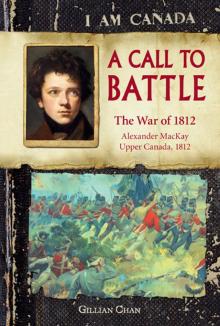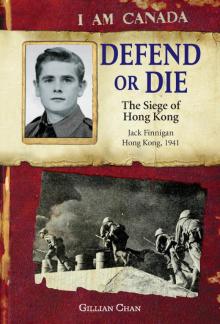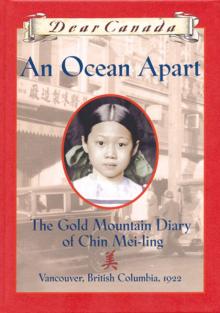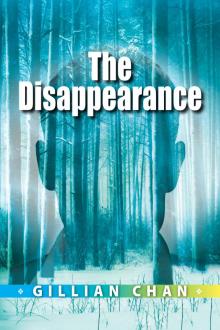- Home
- Gillian Chan
A Call to Battle
A Call to Battle Read online
In memory of Jimmy Durrant 1921–2010
A wonderful father
Table of Contents
Cover
Title Page
Dedication
Prologue: August 1820
Chapter 1: June 1812
Chapter 2: Fall 1812
Chapter 3: May 1813
Chapter 4: December 1813
Chapter 5: July 1814
Epilogue: August 1820
Historical Note
Timeline of Events Pertaining to this Story
Images and Documents
Acknowledgments
About the Author
Other books in the I Am Canada series
Copyright
Prologue
August 1820
I’ve known for six long years that I would have to make this journey. I’ve known it because I promised Father I would when we stood in the trees on the edge of Lundy’s Lane, as the sun burned off the mist, revealing the dead and the dying where they still lay.
It’s not a journey I’ve wanted to make until now, but Fortune has smiled upon me and I have another reason to go, one that will secure my future and my place in the world. It too can be traced to that bloody battlefield.
For days now Mother has been fluttering around like a hen with wet feathers, constantly telling me that I must remember to be careful on the road, to not take up with any ruffians, and to keep my money hidden in the secret pocket she sewed into my jacket, along with the letter from expected to help out on ourthe Phillips family. Anyone would think I was just a boy like my brother Samuel, instead of a twenty-one-year-old. She forgets that I fought alongside Father and Angus in the War when I was just fifteen. Ah, that’s unfair — we never did tell her all. She would not have been able to bear it. She knows it was bad, though. She saw what happened to Angus; saw how Father has been aged by it all. Even now I do not like to think too hard on it, but now I must, because what happened to me then lies at the root of this journey I must make to Pennsylvania.
I was thirteen when war broke out, big for my age — the same size as my brother Angus, though he was five years older. I was broader and stronger, too, like my grandfather. I can see that our nearness in height was just about the only similarity between us. Angus was sunny-natured — nothing angered him, and he was not given to anything sudden. Me, I was loud and complaining, quick to act, with little thought as to what might come of my actions. When I look back, I am amazed at what I dared and the punishments I courted. I resented the way that no one paid me the slightest attention except to give me orders or to reprimand me when I did wrong. I was just the family workhorse, expected to help out on our farm all day with Angus and Father, yet treated as a child on all other occasions.
I remember clearly the day we got news that the Yankees had declared war on us, and how angry I was by the end of it. I grew up on tales of war — Father had fought for the British in Butler’s Rangers during the Revolutionary War. Mother’s brother Roger, too. I liked nothing better than when Angus and I could persuade Father to tell us tales of how he had fought so fiercely for seven years until he mustered out. The stories of how he came here to the Head of the Lake to carve out a home for us were less exciting, but he would not tell one without the other.
I knew that I was ready for such thrilling adventures myself, that I would acquit myself nobly and bravely, if given the chance.
Those memories rise unbidden and freely now and I must honour them, too.
Chapter 1
June 1812
Father, Angus and I were working on framing another room on the side of the house. Mother and my two older sisters, Morag and Polly, had got hold of a fancy notion that they wanted a parlour. A horse came barrelling down from the road to the clearing where our house stood. We heard its hooves, but with it being so dry and hot, such a great cloud of dust was raised that it was hard to see who was coming, until he pulled on the reins to stop his horse and dismounted.
It was Callum Murdoch, the teacher who had set up a school in our village. He and Father had been talking about my going there after the harvest was in, but surely this was not the reason for such a wild ride.
“Robert! Angus!” he called. “Have you heard?” His face was flushed and his eyes shone with excitement.
Conflicting emotions warred within me. I was intrigued that he obviously had news important enough to bring him racing out to our farm, but furious that once again I was being ignored.
Mother, Morag and Polly had come out from the house at the noise. Any visitor was an event. Polly blushed when she saw who it was. She had been sweet on Mr. Murdoch since she’d danced with him at a harvest supper at my Uncle William’s farm.
Mr. Murdoch was grinning. “By your blank faces, I’ll wager you’ve not. Sam Hatt said I’d better come, as you’d not been by his mill for days.” His grin widened. “The militia are to muster. The American president has declared war on us!”
He continued talking, but I let loose with a volley of “Huzzahs!” and shook my fist in the air. That lazy, little ruffian Drew appeared from behind the barn, where he had probably been skulking. He, too, whooped and hollered. Even Samuel pounded his wooden rattle on the boards of the porch.
“Be quiet, you stupid boy!” my father bellowed. He dropped the hammer he was holding, and his arms hung limp at his sides. He exchanged a look with Mother. Her face had paled and I swear that her chin trembled. Father glared at me, and I was hard pressed not to cry. I did not understand. Shouldn’t he be pleased that we would have a chance to pay back the Yankees for the harm they had done our family, and proud that I showed such spirit?
“Father,” I said, trying to make my words ring out, “I may not have the years, but my size and strength equal any grown man’s. I will fight, too!”
Mother let out a small moan and Father rushed over to her. “You’re still a child, Sandy, as your thoughtlessness proves.” His face had flushed with anger and his voice shook. “Go and stay with the little ones while Angus and I talk with Mr. Murdoch. Morag and Polly, see to your mother.”
How dare he treat me so? I stalked up to the porch and grabbed Samuel, who immediately wailed, but I didn’t care. “Ellen, Drew, come with me,” I ordered as I moved in the direction of the barn, trying to stay within hearing distance of Angus, Father and Mr. Murdoch. It was hard to hear what they said because Ellen and Drew, being the pestilential brats that they were, kept up a clamour of questions about what was to happen. Father’s face darkened when Mr. Murdoch said that some of the men he had called on were reluctant to fight, worried about their crops or perhaps even secretly in sympathy with our enemy. Father had no time for such men and was a proud sergeant in the flank company of the 5th Lincoln, chosen for his patriotism and sense of duty. Angus was his younger, mirror image.
After Mr. Murdoch left, Father remained sombre for the rest of the day, abandoning our work on the house and taking Angus away into the woods, muskets in hand. I looked hopefully at Father, silently praying that he might ask me to go with them, if only to hone my shooting skills. Ever since I was big enough to hold a musket, he had taught me, and I swear that I was his equal when it came to marksmanship, better than Angus even. But he did not even glance in my direction and I was too proud to ask, especially after his earlier rebuke. Instead I just bit my lip, thinking that I might manage to slip away and at least watch them.
Mother spent the day sobbing in the kitchen with Morag and Polly trying hard to calm her. The girls had retrieved the baby from me and I hoped I might put my plan into action. Luck was not with me. Morag emerged just as I was drifting towards the woods and ordered me to spend the rest of the day tending our vegetable plots, work she and Polly usually did and which I despised. I looked round for Dr
ew and Ellen, intending to press them into helping me, but, canny as ever, they were nowhere in sight — Drew had likely led Ellen away somewhere to avoid work. I was so angry, it was not only weeds that got pulled. I had to come up with a way to persuade Father to let me go with him and Angus when they marched for the Niagara River with their company. By the time we were all seated for supper, I thought I had a convincing argument to make.
Mother was no longer crying, but her eyes were red and she clutched Samuel tightly on her lap, kissing his curls every so often, as Morag and Polly served our meal. Normally our meals are lively, but for this one we took our cue from Father, who sat silent as he methodically chewed his food, his eyes apparently seeing nothing but his plate. I could hardly eat, waiting for him to say something so I could plead my case and change his mind.
With the last bite eaten, Father finally laid down his fork and patted Mother’s hand. When he spoke, his voice was steady and he looked round the table at each of us. “My children, you heard the news that Callum Murdoch brought today and you know that we are living in unsettled times. I must ask you all to come together so that we can face them and come through stronger than before. Angus and I will leave tomorrow to join our regiment, so it will fall to you older ones, Morag and Polly, to help your mother keep the farm running, and to look after the wee ones.” Father paused and looked directly at me. “Sandy, you will be the backbone of the farm, taking on the work your brother and I do.”
I tried to protest, but he cut me off. “It will be hard, but your sisters will work in the fields when they can and you will be able to turn to your Uncle William for help and advice, should you need it. He’s too old and lame to fight.” Father paused, then looked at Drew, his voice soft but stern. “Andrew, you can no longer play as much now. You’re a big strong boy for your age and it’s time for you to do your share and listen to your elders more. Sandy will help teach you the outside work that needs to be done.”
I was pleased that Father realised Drew was a lazy rascal, and using his full name showed how serious he was, but I could not let him continue. I had to speak. “Father, you have to let me go with you. I can fight as well as any. You know what a good marksman I am, thanks to your training. You’ve said how large and strong I am. I know I should be sixteen to join the militia, but they would take me with your permission, I know they would. Younger boys have gone, some even instead of their fathers. Mother and the girls can manage for the time it will take us to send those cowardly Yankees packing. Mr. Murdoch even said that some men hereabouts are laggards who do not want to fight. Let me take their place. I beg you, Father, please say I can fight!”
Father didn’t shout this time, just shook his head wearily. “Sandy, war is not a glorious game. It’s no place for a boy with a head full of dreams. Our crops need to be tended and it’s because of your size and strength that I need you here. You may be young but you can do the work of a grown man, and it will be one less worry for me while I am away.” He sighed. “Not everyone can say that, and I can understand why there will be those who will not answer their call to duty.”
When I tried to argue, Father held up his hand. “Enough, Sandy! I will not debate this with you.”
I could not help the tears that sprang into my eyes, and hung my head so they could not be seen. I heard what Father said, knew that he meant it, but his words did not dampen my anger. I would go, somehow.
The next day, Father and Angus made their goodbyes as the sun was just rising. They were dressed alike in linen shirts, already damp with sweat, with their muskets slung over their shoulders and a bag of shot. Each had a rolled, wool blanket and Angus was carrying a small sack of provisions that Mother had put together, while Father had their water skin.
After her tears of the day before, I was surprised to see Mother dry-eyed. Her voice was steady and gave no sign of her worries, although her words did. She leaned into Father, one arm around his waist, her other hand reaching up to gently touch Angus’s cheek. “Rob, you take care. And I need you to bring my boy back to me.”
“That I will, Hannah. I promise.” Father looked over at the rest of us where we stood on the porch, as if he wanted to memorise each and every one. “Come say goodbye,” he said, and held out his arms.
The others all hurried over to be hugged, but I hung back. Father did not say anything, just let his arms drop to his side as he looked steadily at me.
Mother’s face coloured red and she moved towards me, grabbing my arm and pulling at me. “Enough of this sulking, Sandy. It ill becomes you. Now make your farewells to your father and brother!”
I allowed myself to smile. “If I am big enough to work like a man, I’m too big to be hugged like a child.” The words tasted bad in my mouth, but I could not help myself.
Mother reached up to try and cuff my ear, but her blow was weak and fell short, merely grazing my shoulder. Her tears had returned and choked her voice. “You’re a stubborn, nasty boy and I hope that you will not come to regret your actions today, Alexander!”
I said nothing, just turned and walked to where I had left my hoe, picked it up and headed towards our fields. I did not look back.
Chapter 2
Fall 1812
It was several months before we saw Father and Angus.
Those months seemed a never-ending haze of work for Drew and myself, although Morag worked in the fields alongside us, leaving Mother and Polly to tend to the house and garden. We were up at sunrise and never seemed to stop until sundown, gulping down our food and going to bed, only for the whole round to start again the next morning. Drew surprised me. He whined at first and cried a little when he could not go roaming in the woods with Ellen, but soon he was no longer a hindrance but a help, a pair of hands always there and willing. Morag, too, proved herself as good as many men. She borrowed a pair of Angus’s breeches and an old shirt he had left behind. Before we started work she would hide in the woods at the edge of the field to change into them, for if Mother had seen her dressed like a boy she would have had a conniption. I was proud that we got our harvest in, and a bumper one at that, with just a little help from Uncle William, who came for only one day with his hired man.
Where we missed Angus and Father most was the accounts. I was a better scholar than most. Father had made sure of that, making us all practise our letters and numbers, and whereas I might chafe at spending evenings doing this, such things came easily to me, more than they did to Angus, who had to work far harder. He was diligent and less hasty than I was and his neat script and orderly columns of figures made my blot-and-cross-filled efforts look very poor indeed.
What I liked most were the books that Father at first read to us, and which I later was able to read myself: histories and verse. Before the war broke out, Father had said that he could teach me no more and if we had the money I could perhaps go to the school that Callum Murdoch ran in Ancaster.
When some of the militia came back only days after they had left, I could see how it pained Mother that Father and Angus were not among them. Her worry grew when news slowly filtered back of fighting at Detroit, and then at Queenston. The Macdonnells in Cootes Paradise were grey-faced at our Sunday services after learning that their son Martyn had died from wounds he received. Martyn was the same age as Angus, and I know that even as Mother comforted Mrs. Macdonnell, she was fighting to keep her fears for her own son in check.
As her worry grew I will admit that mine did, too, when others who had been wounded made their way back. Callum Murdoch was just such a one and we all prayed for him as his life hung in the balance for what seemed like a month. Only the devoted nursing of Amy Mason and Callum’s family pulled him through, although he would never walk without a limp and would certainly never fight with the Lincolns again.
At dinner, we often talked of what news had come, and wondered why we had had none from Father. One night, Mother shook her head ruefully when Ellen asked when Father and Angus were coming home. “Your father has always had a strong sense of duty, E
llen. If they call for volunteers to stay, he will be the first, with Angus but a beat behind him.”
“I’d be like that, too, if only I had been allowed to go!” I said.
Mother sighed. “I know, Sandy. No one doubts you, but you are needed here, and a fine job you’ve been doing, too.” She forced a smile, but then grew serious again. “It’s the not knowing that is so hard to bear. No matter what I am doing, my mind is always with them, wondering where they are and whether they are safe.”
I knew what Mother meant, as I hungered for news as well, but it was the progress of the war and whether there might be an opportunity for me to become part of it that were foremost in my mind, not how my father and brother fared.
My visits to the Red Mill were the only bright spots in my existence. Sam Hatt and his brother, Richard, the owners of the mill, served in the 5th Lincoln, too — although they were officers, as befit their standing in our community — so the mill was the best source for news. It was there that I heard of Tecumseh and General Brock’s cunning ruse in tricking the Americans at Fort Detroit, by having Tecumseh’s men appear to be a much larger force. I laughed as Mr. Hatt described how Brock had had them run in and out of the woods, shrieking and yelling. There was much ill feeling between the Yankees and Tecumseh’s men, whom they feared for their viciousness both in fighting and its aftermath. The Americans were so afraid of what the warriors might do if they were victorious, Governor Hull surrendered the fort, and a large store of weapons, to a force much smaller than his own.
Mr. Hatt himself, home for a while to manage his affairs, told me what a stalwart my father was, how the younger men looked up to him. It reassured me that he and Angus were all right — news that would calm Mother and the girls — and which made me glow with pride.
It was at the mill, too, that news of the glorious but sad victory at Queenston, and of the loss of brave General Brock, came. I had so many questions and they came bursting from me, but apart from telling me that Father had come through unscathed while Angus had had a musket ball part his hair for him, Mr. Hatt was not forthcoming, turning his attention to other customers as if I were of little account. I seethed with anger, wanting to know more, wanting to tell him that my father had ordered me to tend the farm — otherwise I would have been there, too, and likely in the thick of the fighting. I went home in a fine temper at the injustice of my situation and poor Drew bore the worst of it as I ordered him around and found fault with everything he did, in my frustration.

 A Call to Battle
A Call to Battle Defend or Die
Defend or Die An Ocean Apart
An Ocean Apart The Disappearance
The Disappearance